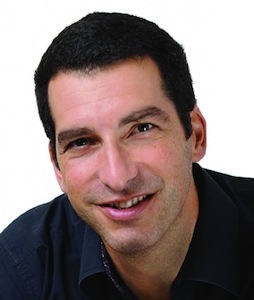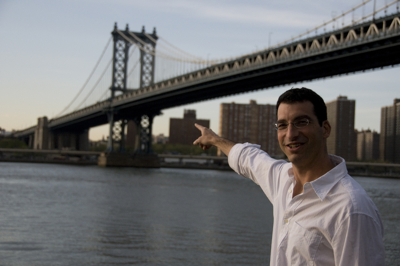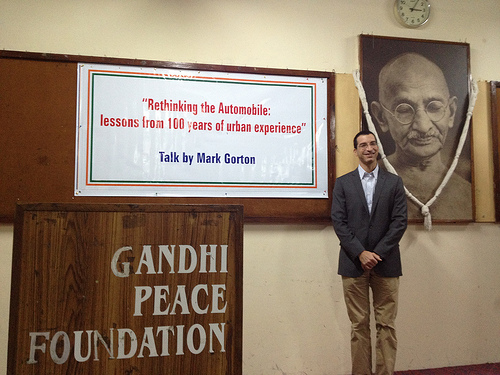- The Inside Story Of Limewire From Founder Mark Gorton
- Learn About High Frequency Trading From Tower Research
- Hear About Open Government from openplans.org
Full Interview Audio

Personal Info
Sports Teams:New York Jets
Favourite Books:
- The Power Broker: Robert Moses and the Fall of New York by Robert Caro
- The Path to Power: The Years of Lyndon Johnson, Volume 1 by Robert Caro
- Means of Ascent: The Years of Lyndon Johnson by Robert Caro
- Master of The Senate: The Years of Lyndon Johnson by Robert Caro
Most Influenced By:Benjamin Franklin, Warren Buffett, Richard Branson
Website: http://www.tower-research.com
Relevant Link: http://rethinktheauto.org
Interview Highlights
This is a condensed, lightly edited transcript of an audio interview. The full audio is available and highly recommended. The interviewee may post clarifications in the comments.
Adrian Bye: Today I’m here with Mark Gorton, Mark is the founder of LimeWire. He works now at a high frequency trading company in New York and he’s also been working on a project called OpenPlans, which a lot of people are excited about so Mark, thanks for joining us and welcome.
Mark Gorton: Thanks for having me.
Adrian Bye: Do you want to tell us a little bit about who you are and where you come from?
Mark Gorton: Sure, I live in New York City. I’m a technology entrepreneur. I started Tower Research Capital, which is the quantitative trading firm that I still run today.
Adrian Bye: Why don’t we talk about LimeWire, maybe can you tell us how you founded that, how that came about?
Mark Gorton: Sure, this goes back to 2000, back during the heyday of the Internet bubble. At that time there was a lot of excitement around P2P and there was talk that you could reinvent the whole Internet using P2P technology and I jumped into that and I started LimeWire.
Adrian Bye: And so did you go out and raise money or was it all self-funded?
Mark Gorton: It was funded by myself. I took some of the profits that I had made from my trading and I used it to fund LimeWire.
Adrian Bye: So you were always trading, this was an extra thing that you went into?
Mark Gorton: Yes, LimeWire was never my main business.
Adrian Bye: And so the idea of P2P sharing was hot and the trading business was doing well and you thought you’d try something else, so you get LimeWire started. Is that basically how it happened?
Mark Gorton: Yes, basically. We had a bunch of ideas in the beginning that were how you could take P2P technology and use that for all sorts of distributed search. I imagined having a whole business ecosystem using P2P technology that never really got bootstrapped.
Adrian Bye: How did you get traction in the beginning? A lot of people have tried to build file-sharing networks or P2P networks and failed, what made yours work?
Mark Gorton: We had a good team of engineers, making the software work well, that was really always our focus. We were always an engineering-oriented company and just focused on the basics of performance. We built a very good file-sharing application and people recognized that and we grew.
Adrian Bye: How was it as a business?
Mark Gorton: It was one of those businesses where it had a huge number of users and you don’t make particularly much money off of any one user but given the large numbers it was a profitable business in its heyday.
Adrian Bye: I’ve used LimeWire in the past and I remember it being massive! I guess that’s the leverage of the Internet.
Mark Gorton: Yes. We got up to 50 million people a month or something like that. But it’s all P2P; we just made a piece of software that people downloaded. All of the operations of the network were distributed on people’s computers and as such it was probably scaled a lot more easily.
Adrian Bye: I think once or twice the Skype network has crashed, did you ever have problems like that?
Mark Gorton: One of the advantages and disadvantages of a highly decentralized network, is that you don’t ever get any sort of true robustness. I mean, it was always crashing in some small way, but because it was just so many different people connecting to so many other people that you could have pockets of it fail while other ones are doing fine.
One of the drawbacks is this lack of reliability. That really does limit its application because there are a lot of transactions out there that people really want to be highly reliable. And all of the problems making distributed searches a much more difficult problem than centralized search.
Adrian Bye: I remember search was slow.
Mark Gorton: Yes, honestly I am now much more of a believer in centralized things. For philosophical reasons it bothers me that Google has this giant near monopoly control of search but from an engineering point of view I don’t think there’s any arguing that centralized search works better than decentralized search.
Adrian Bye: How on earth did you get into P2P and file-sharing? That would seem quite far away from your area of focus.
Mark Gorton: Well I guess the one thing that pretty much all of my businesses have in common is that technology focus. Tower is really a collection of engineers for the most part so it’s much more similar to a software company than it is a traditional finance company.
Adrian Bye: So for you it’s just hiring more engineers and motivating them to get projects done?
Mark Gorton: Well, there’s a little more than that! But that is common to everything.
Adrian Bye: Did you have concerns about the problems with the RIAA that ended up coming off?
Mark Gorton: Probably I was a bit naive, I thought that there was such a good opportunity and that LimeWire reached so many people who RIAA would want to be able to engage with. The untold story of LimeWire is that we had a music subscription service that was really better than iTunes. We had worked out deals with three of the four major record labels, the independents and the publishers but we just couldn’t reach a deal with the last one so the whole thing fell apart. It was really a great loss for everybody.
Adrian Bye: So your main business is Tower Research, do you want to tell us a little bit about that?
Mark Gorton: Tower Research Capital is a quantitative trading firm. We do a lot of automated computerized trading. We process a huge amount of data in real time and we trade a whole lot. We have really good teams of engineers who are processing this data and trying to build trading models that have some predictive power. We’re reasonably successful as a proprietary trading firm.
Adrian Bye: There was an article in the press that said that guys like you are bad because you’re talking the human element out of the market and I’d be curious as to your comment.
Mark Gorton: There’s no doubt that markets are automated now in a way that they weren’t 15 years ago. I think that is actually a positive thing. We’ve never had markets that are more efficient than what we have today, and that has radically lowered the cost for individual investors. But there is an old guard on Wall Street who have really nice profitable jobs intermediating those orders and now those jobs are being automated out of existence -and as far as the end customer, that’s good because you have less high paid middle man in there and you’re able to transact cheaper because of that.
Adrian Bye: When there’s these big market crashes it’ll get blamed on high-frequency trading, is that part of why that’s happening?
Mark Gorton: Yes. High-frequency trading is somewhat new and people don’t understand it so well. I think some of it is that there are some very sophisticated players out there who are cleverly trying to distort the public’s perception of things. I would say, of the changes on Wall Street that have happened in the last 20 years this has really been one of the big plusses for the general public.
Adrian Bye: So aside from the reduction in trading costs what is the value provided to society by high-frequency trading?
Mark Gorton: It’s really more efficient markets, and society sees that value as lower trading costs and at the end of the day more money in their bank accounts.
Adrian Bye: In other businesses you build up a brand, you become known you have systems that back that, do you not build that with what you’re doing?
Mark Gorton: Well, again in the little world of quantitative trading Tower has its own little brand and we are constantly making our systems faster and more robust. Proprietary trading is not the most stable and enduring business. I mean I would rather be in the toothpaste selling business where you know that people are still going to be buying toothpaste a decade from now! In the business that we’re in the only thing I know for sure is that if we don’t reinvent ourselves every year then someone else is going to come and eat our lunch.
Adrian Bye: I would find it frustrating to be doing something where you had to keep being on the run all the time.
Mark Gorton: Well I think that’s a lot of business right there, particularly the technology business. Look at Nokia they were, not that long ago, top of the world, couldn’t do any better and now they’re struggling to stay in business, all it takes is one round on innovation which you miss.
Adrian Bye: Have you ever had a bug come up that’s caused you to either lose or make money?
Mark Gorton: One of the things about trading models is that, as opposed to some other types of software, it’s not necessarily super clear if it’s working or not! I’m sure that there are lots of little bugs or imperfections in the trading parameters. All the models you’ve built are built on historical data so, if the future looks the same as the past then you can make inferences about what the future will be like. One of the things about markets is that they are constantly changing their behavior so trying to figure out what is appropriate not for the past but for the future is part of the challenge.
Adrian Bye: People complain about high-frequency trading causing all these losses in the market. Is that really being caused by high-frequency trading?
Mark Gorton: No, it’s not caused by high-frequency trading. If you look at the joint SEC-CFTC report it shows that the high-frequency guys were adding liquidity and net buyers when the market was going down but we don’t get any credit for that.
Adrian Bye: Do you want to tell us about what you’re doing with OpenPlans?
Mark Gorton: OpenPlans is a not-for-profit that I fund that has two major missions. The first is that it focuses on the Livable Streets movement and transportation reform, advocating improving the pedestrian realm and making it easier and safer to bicycle, promoting transit, reducing the harmful impact on the automobile on our society.
A lot of what we do focuses on open source government. By that I mean advocating for governments using open data standards, open-source software and open-source software procurement techniques in order to change the way government information systems are built from the basically closed proprietary model that we have now. We’re beginning to bootstrap that in a few areas. Our biggest software project is called OpenGeo, which is an open-source geographic information system. We’ve been getting a lot of people and government agencies using it.
One of the big things we’re pushing for is this idea of openness in government, not just conceptually but in practice and I do think that open data standards are very important. I think that ultimately you can get there and we’ll be able to see enormous increases of efficiency and cost savings and improvement in transparency and in the way that citizens can interact with various government agencies, and reductions in corruption.
Adrian Bye: Anything else you want to talk about on OpenPlans before we go on to the next topic?
Mark Gorton: I will say that the US government spends over $100 billion a year on software and almost all of that money goes in the form of closed source proprietary software. If the government starts to direct that money towards open-source procurement I think you would see in a fairly short period of time the creation of this digital commons which can really be a huge resource.
I can give you just one very specific example, which is bike-share. OpenPlans have built for the New York city department of transportation a website that allows community members to request a bike share station at a particular location, which is useful for the people running the system to figure out where they’re going to site the stations. We built this system for New York and then another large city are taking the same software, adapting it to their own system and able to roll that out. What you’re seeing is that as New York builds this software using open-source procurement techniques you now have a digital resource which other cites can take and build upon and save money doing that.
Adrian Bye: Why is this not discussed more?
Mark Gorton: I think there’s a few reasons. One: it has to do with governments, which is slow and frustrating. Two: this idea isn’t about a company making money, in fact it’s about creating a system where the software companies actually make less money.
If you’re a systems architect these ideas may seem perfectly natural but very few people who are making procurement decisions are familiar with these concepts, so that’s a lot of what OpenPlans is doing; trying to educate people about this potential.
We’ve done some projects with the Metropolitan Transportation Agency where we have built this system with this open data stack for the bus time systems so now it’s possible to, on your computer or iPhone, see where the buses are. It was a very different procurement model but if you can get the MTA, which is the largest transit agency in the county to do this, you really can get anybody to do it.
Adrian Bye: And so now the MTA is running your system?
Mark Gorton: Yes, it’s currently rolled out in Staten Island and it’s going to be rolled out in The Bronx very soon and it’ll be across the whole city within a year or so.
Adrian Bye: You sent me a link to your new site, which is jux.com. Why don’t you tell us a little about what that does?
Mark Gorton: It is a social media site. Right now, the biggest group of users is people who are photographers or who have a photo portfolio. It’s a really nice, beautiful, clean site on which to post photographs and annotate them. Eventually we want it to be a personal content repository for people who want to build up something nice on the web that’s not branded as Flickr or Facebook but that is really your own.
Adrian Bye: Is there anything else you’d like to tell us before we wrap up?
Mark Gorton: I think that’s good. I can talk for hours but there’s probably a limit to how much people want to hear me talk!
Adrian Bye: Well, Mark thanks very much for doing the interview.
Mark Gorton: Thank you.









